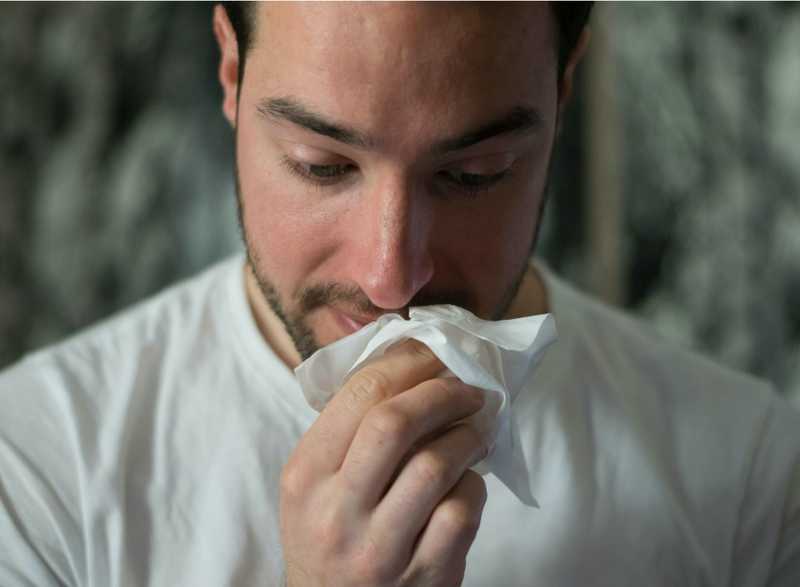Marijuana allergies—are they a real thing? It seems so, according to some research, a few case studies and that one person you met at a party awhile back. The first incidence of a cannabis allergy was reported over 40 years ago.
Since then, there have been some reports of respiratory allergies due to cannabis pollen exposure as well as skin rashes from direct contact with the plant. It’s likely that as more countries change their laws to allow cannabis consumption, incidences of marijuana allergies will increase.
FOLLOW US ON FACEBOOK & INSTAGRAM
So, what causes a marijuana allergy, and how do you know if you have one? And more important, what should you do if you think you’re allergic to cannabis?
What Are the Symptoms of a Marijuana Allergy?
Common respiratory symptoms from a cannabis allergy include:
- Red, watery eyes
- Sneezing
- Runny nose
- Congestion
- Nausea
- Vomiting
Some people also experience an allergic reaction when coming into direct contact with the plant. These reactions can cause the skin to become:
- Itchy
- Inflamed and red
- Dry and scaly
More severe symptoms can include an anaphylactic response, a type of allergic reaction that can include difficulty breathing and shock.
Is It a Marijuana Allergy vs. a Reaction to Something Else?
It’s important to be able to distinguish allergy symptoms with the common side effects of cannabis consumption like dry eyes and dry mouth. While these side effects can be uncomfortable, they’re just a normal part of cannabis consumption.
RELATED: 3 POPULAR QUESTIONS ABOUT MARIJUANA & ALLERGIES ANSWERED
Another thing to keep in mind is that sometimes your method of consumption could be triggering an allergic response—not the cannabis itself. For example, if you’re smoking cannabis and experiencing allergy symptoms, the smoke itself could be the culprit.
It’s also possible that the marijuana you’re consuming is moldy, which can also irritate the respiratory system. And if you’re using a topical, it’s possible that other ingredients in that topical are causing your skin to become irritated.
So, how do you know if you’re allergic to cannabis and not something else? Unfortunately, there isn’t a standard test that you can take to see if you have a cannabis allergy. And while some studies have used skin prick tests to figure out if someone has a cannabis allergy, these tests require that the tester have an actual cannabis preparation on hand—something that isn’t likely with the plant’s illegal federal status.
The Potential Causes of Cannabis Allergies—From Enzymes to Proteins
What substance in cannabis could be causing these allergic reactions? Let’s take a look at that first reported incidence of a marijuana allergy, which took place in 1971. This involved a 29-year-old woman who had an anaphylactic response.
The doctor who completed the case report indicated the reaction was an immune response—perhaps due to a cannabinoid, more specifically, tetrahydrocannabinol (THC). Though it’s entirely possible that THC is an allergen for some people, other studies suggest that there are other components of the plant at play as well.
One study points to enzymes found in cannabis pollen. Other studies have found that a variety of proteins, including lipid transfer proteins, could be responsible. These enzymes and proteins are common allergens that are also found in food items like apples, tomatoes and apricots.
These studies could explain why some European studies point to an allergen cross-reactivity between cannabis and some foods like tomatoes and citrus, including grapefruit. What this means is it’s possible that developing an allergy to cannabis could also cause your body to negatively respond to certain foods and vice versa. Though more studies are needed, it’s likely that there are many things in cannabis that cause an allergic reaction.
These studies have also noted that cannabis sensitization is a real possibility. That is, repeated exposure to cannabis could cause the body to develop an allergy. One study in Spain found that cannabis smokers were more likely to have a positive skin prick test for cannabis. These findings, though preliminary, don’t bode well for cannabis consumers and those who work in the industry.
How Are Cannabis Allergies Treated?
While there’s no set treatment for a cannabis allergy, people often address symptoms via typical routes like taking antihistamines, steroids and decongestants. Of course, folks could also choose to avoid cannabis. However, this can be impossible for some people who live in areas where cannabis is grown, or who have a loved one who relies on the plant for medicine.
If symptoms are more severe or start to affect quality of life, like most other allergy cases, immunotherapy can be a solution. In fact, there are a few cases studies where this type of treatment was used and resulted in reduced respiratory symptoms.
Overall, cannabis allergies are still uncommon, though they’re being reported with more frequency. As cannabis continues to enter the mainstream across the globe, more and more people will become exposed to the plant. And since, studies suggest that exposure can lead to the development of a cannabis allergy, it’s in our best interests to advocate for more research on the topic.
Photo credit: Brittany Colette
If you’re new to cannabis and want to learn more, take a look at our Cannabis 101 index of articles. HelloMD can help you get your medical marijuana recommendation; it's easy, private and 100% online.
